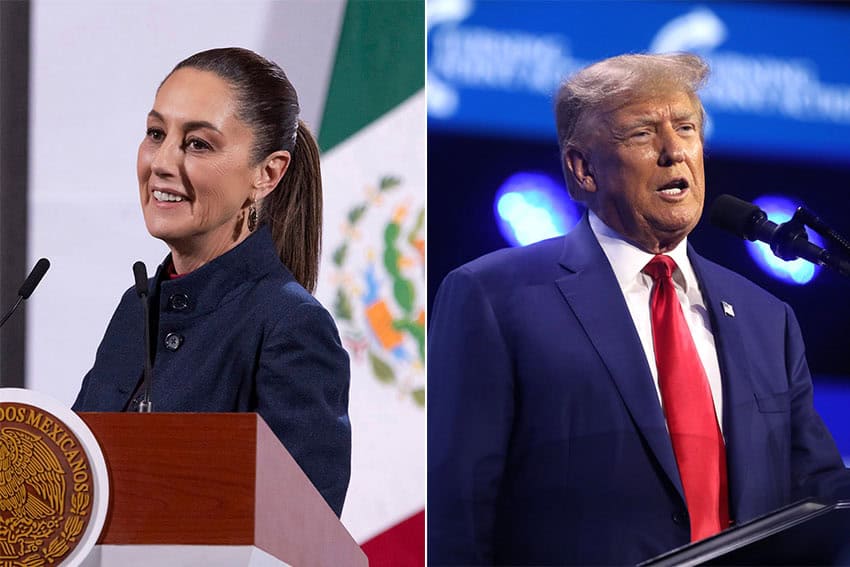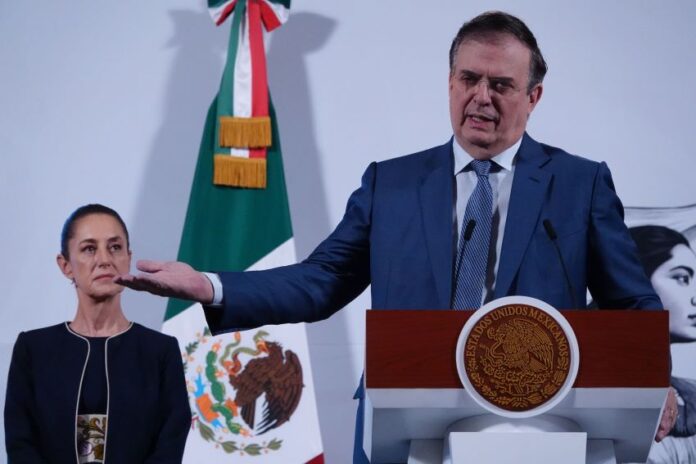Between 85% and 90% of Mexican goods exported to the United States won’t be subject to tariffs as a result of U.S. President Donald Trump’s decision to suspend tariffs on imports from Mexico covered by the USMCA free trade pact.
That was the estimate given by Economy Minister Marcelo Ebrard at President Claudia Sheinbaum’s morning press conference on Friday.

After a call with Sheinbaum on Thursday, Trump announced that he had “agreed that Mexico will not be required to pay Tariffs on anything that falls under the USMCA Agreement” until April 2.
The United States imposed 25% tariffs on all imports from Mexico and most imports from Canada on Tuesday due to what the White House said was the two countries’ failure to adequately stem the flow of “lethal drugs” such as fentanyl into the U.S.
According to a White House fact sheet issued on Thursday, “duties imposed to address the flow of illicit drugs across our borders are now:
- 25% tariffs on goods that do not satisfy U.S.-Mexico-Canada Agreement (USMCA) rules of origin.
- A lower 10% tariff on those energy products imported from Canada that fall outside the USMCA preference.
- A lower 10% tariff on any potash imported from Canada and Mexico that falls outside the USMCA preference.
- No tariffs on those goods from Canada and Mexico that claim and qualify for USMCA preference.
Vast majority of trade will occur under USMCA, says Ebrard
Ebrard explained that some companies in Mexico don’t export goods to the United States under the terms of the USMCA, but rather “resort” to “most-favored nation” status.
They do so, he explained, because “it’s more expensive” for them to comply with USMCA rules, especially rules of origin, than to have their goods subject to most-favored nation status tariffs.
Ebrard said that “normally” more than half of “our trade” occurs under the rules of the USMCA.
However, he asserted that “a very significant number” of the companies that have chosen to export goods to the United States in accordance with most favored nation status rather than under the USMCA can “easily or without major difficulty” comply with the rules of the North American free trade pact and thus avoid tariffs, at least until April 2.
“We estimate that [goods exported under USMCA] will increase to more or less 85% [to] 90% of foreign trade from Mexico to the United States,” Ebrard said.

He estimated that around 10-12% of exporters in Mexico, mainly in the automotive sector adjacent industries, will not be able to comply with USMCA rules and will thus face 25% tariffs on their exports to the U.S.
“We have to work with them … [during] the next three weeks,” Ebrard said.
‘What’s going to happen in April?’
Ebrard, referring to the April 2 conclusion of the tariff suspension agreement, posed that question during his remarks to reporters at Sheinbaum’s Friday press conference.
The economy minister noted that the United States intends to impose reciprocal tariffs on its trade partners starting April 2.
He said that Mexico will find out in early April what tariffs the United States will impose on imports from its southern neighbor and “all the countries of the world.”
This month, the Mexican government will “be negotiating and presenting the arguments of Mexico” to avoid the imposition of tariffs on Mexican goods next month, Ebrard said.

Sheinbaum emphasized on Thursday that because Mexico doesn’t impose tariffs on imports from the United States, a “reciprocal relationship” with the U.S. would be one in which “they don’t charge us tariffs either.”
In that context, she expressed optimism that tariffs won’t be imposed on Mexican goods when the United States places reciprocal tariffs on imports from other countries next month.
The president, Ebrard and other Mexican officials have repeatedly stressed that tariffs on Mexican goods will have an adverse impact on the United States economy and increase prices for U.S. consumers.
Sheinbaum said Tuesday that Mexico doesn’t want to enter into “an economic or trade confrontation” with the U.S., saying that such a situation is the “opposite” of what the North American region “should be doing.”
The countries of North America, she said, should be “integrating our economies more to strengthen our region in the face of the economic and trade progress of other regions.”
‘We have to reach an agreement on steel and aluminum’
Ebrard noted that the United States still intends to impose 25% tariffs on its steel and aluminum imports, including those from Mexico, on March 12.
The economy minister said he has been asked whether Trump’s suspension of tariffs on imports covered by the USMCA would apply to steel and aluminum. He indicated the answer is no.
“We have to reach an agreement on steel and aluminum,” Ebrard said before reiterating that the United States has a surplus with Mexico on the trade of those metals.
He said that Mexico is in talks with the United States on the issue “because a tariff on [Mexican] aluminum and steel is not justified.”
Ebrard said last month that tariffs on Mexican steel and aluminum are illogical and a “bad idea” due to the United States’ surplus with Mexico on the trade of the metals and the integration of the U.S., Mexican and Canadian economies.
Mexico News Daily
